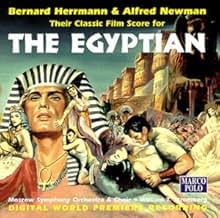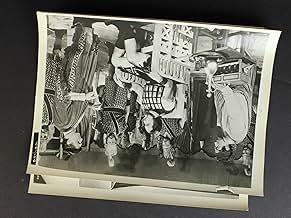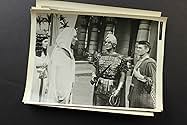Im alten Ägypten wird aus einem armen Waisenkind ein liebenswerter Arzt, der schließlich an den Hof des Pharaos bestellt wird, wo er Zeuge von Palastintrigen wird und gefährliche königliche ... Alles lesenIm alten Ägypten wird aus einem armen Waisenkind ein liebenswerter Arzt, der schließlich an den Hof des Pharaos bestellt wird, wo er Zeuge von Palastintrigen wird und gefährliche königliche Geheimnisse erfährt.Im alten Ägypten wird aus einem armen Waisenkind ein liebenswerter Arzt, der schließlich an den Hof des Pharaos bestellt wird, wo er Zeuge von Palastintrigen wird und gefährliche königliche Geheimnisse erfährt.
- Regie
- Drehbuch
- Hauptbesetzung
- Für 1 Oscar nominiert
- 1 Gewinn & 2 Nominierungen insgesamt
Empfohlene Bewertungen
The first and most important fact for me in this movie is the psychological development of the main character that Edmund Purdom plays. Sinuhe, having been brought up in a simple family by his step parents, becomes a physician. All his life, he never stops asking a question "why?" and searching for the answer. Alluring love that he finds in a courtesan Nefer (Bella Darvi) leads him to financial and spiritual disaster. He has to repair the mistakes by hard work in the House of Death and starting to build up his reputation from nothing. First, he thinks that the only cure is revenge. However, in the long run, he realizes that "eye for eye" is no solution. Finally, what stands before him in very strange circumstances is the temptation to be a pharaoh. Nevertheless, there is one moment he finds the answer for his questions that touched him throughout his life... The story of the main character, though based on the book, is so interesting psychologically that every open minded person should consider this aspect in the film. The main character's psychological struggle is intensified by the times he lived in, the times when, probably for the first time to that extend, the power of sword clashed with the power of thought.
Curtiz's movie also retains one rule that all films of his era kept to: great cast and lavish sets. There are mostly British actors and actresses who give very nice performances. How is it possible not to mention the mainstay of ancient epic, Victor Mature. This time, he is not Demetrius, Hannibal or Samson but Horemheb - a fighter, a lover, at last a pharaoh. Jean Simmons appears in a very delicate role of Merit, a woman who loved Sinuhe all her life but it was too late when he realized that. Peter Ustinov, probably most famous for his gorgeous performance as Nero in QUO VADIS? three years earlier, does a great job as Kaptah, Sinuhe's friend. The royalty of the film is also played by two great cast, Gene Tierney and Michael Wilding. Tierney is excellent as cold, desirous of power Baketamon, the sister of pharaoh. Wilding gives a marvelous performance as "insane" Akhnaton. When I was in Louvre in Paris and saw Akhnaton's original face carved in stone, he looked very much the same as the actor in the film. Bella Darvi, an actress born in Poland, is quite memorable as a wicked courtesan Nefer. And there is one more actress who appears only in one scene but whom it is hard to forget, Judith Evelyn as Taia, pharaoh's mother. This voice, these eyes!
The sets are magnificent. The director recreated the most probable image of the outdoor temple of Aaton, the god that the Egyptians worshiped to in the reign of Amenhotep IV. I also loved the scene of pharaoh's first entrance. What a glorious picture that forever lasts in one's memory!!! However, there is also one aspect that I would like to draw the attention of all people interested to see the film. The Egyptian is similar to other epics in many respects, but it also stands out as a unique film. There are very few films which make such a wonderful use of different curiosities as for ancient times. There is a mention of iron used first by the Hetites. It's also the only film about ancient Egypt which talks openly of Egyptians' magnificent curing abilities. It memorably shows the contrasts of lifestyles, particularly the moment of a slave's death for whom no one cares followed by the announcement and consequently the widespread mourning after the death of pharaoh. Finally, "The Egyptian" shows one historical fact: there were other nations except for Jews (before Christ) where the spirit of God shone in some human hearts. Yet, the only difference was that it did not survive that long as at Jews' because it did not have a strong fundament. The scene of Akhnaton's death supplies you with so many biblical and Christian values that you may think you watch a religious movie.
All things considered, I highly recommend Michael Curtiz' film. It is a great production at multiple levels: an entertainment for epic fans, an admiration of marvelous performances for cinema fans, a soul feast for spiritual people. Finally, it is a beautiful story of extraordinary things which happened thirteen centuries before the birth of Jesus Christ.
The story is unique (as is the movie). "The Egyptian" was a best seller in the early 1950s, and Darryl Zanuck decided to take a chance making it: yes he wanted a showcase for his girlfriend Bella Darvi as Nefer, as well as the rest of the cast (Victor Mature, Edmund Purdom, Peter Ustinov, Michael Wilding, and Gene Tierney), but he was aware that these films rarely made large box office. One can chalk up this as an example of Zanuck trying something different.
The number of movies that deal with ancient Egypt are very small. "Land Of The Pharoahs", "The Egyptian", "The Ten Commandments" (both De Mille versions), "Moses", "Holy Moses!", "Cleopatra", "The Mummy" (all versions), "The Scorpion King". If there are 20 films about ancient Egypt it's is tremendous. But "The Egyptian" is unique. While the second "Ten Commandments" discusses Ramses the Great (Pharoah Ramses II - Yul Brynner) and his father Seti I (Cedric Hardwicke), and the films on Cleopatra deal with her, few other names of ancient Egypt crop up in film. Egypt's greatest Pharoah was Thutmose III, who conquered most of the known middle east of the era of 1470 B.C.E. or so. No film about him has appeared, nor of his usurping predecessor, history's first great female ruler Hatschepsut. But the only known Pharoah who attempted a religious revolution that approached what the Jews (and later the Christians) attempted - a type of monotheism - is the subject of "The Egyptian". This is Pharoah Akhnaton.
In reality Akhnaton was practicing a personal form of monotheism that was not meant for public consumption. But it angered the priestly class who worshiped Amon, rather than Aton. Due to our uncertain historic records (although Akhnaton's official records - the "Tel-el-Amana" letters - are quite complete as far as they survive), we do not know if the Pharoah was killed in a palace coup or not. However he died, he was succeeded by a young brother or son of his whose name is better recalled than any other Pharoah except Ramses: Tutankhamon.
This film is actually quite good as far as it goes. Wilding makes a good natured Akhnaton, who is too weak to be as effective as a religious reformer is supposed to be. Mature is good as the ambitious (and - outside the film - ultimately successful future Pharoah) Horemheb. Tierney and Purdom do well in their lead parts and Ustinov is good as Purdom's friend. Also good is Ms Darvi, in a large supporting part. In a wonderful cameo is John Carridine, as a philosophical grave robber. The film is certainly worthy of viewing, as one of the few attempts to show part of the history and culture of Ancient Egypt.
Purdom is admittedly a bit stiff in the lead role, but one can accept this as part of Sinuhe's character. Victor Mature is, well, Victor Mature. Peter Ustinov is a delight to watch here , in the type of role which he always did so well and so wittily. Bella Darvi's performance as Nefer is classically camp, and I find even Michael Wilding's rather dry portrayal of Akhenaten to have its own appeal.
The historical oddity of Akhenaten's monotheism, a brief detour in ancient Egypt's history, is interesting, as is Akhenaten himself, and well worth reading about; the religious wars portrayed here have a basis in fact.
An interesting footnote regarding Darvi, whose birth name was Bayla Wegier: she was a Polish émigré who producer Darryl Zanuck and his wife Virginia took under their wing (I believe they may even have adopted her). Her screen name Darvi is formed from Zannuck's and his wife's first names. She continued her acting career in France, but never achieved great success and, after a rather unhappy life, died at her own hand in 1971.
Altogether this is an interesting film and enjoyable to watch both for the visual values and for the history. Turner Classic Movies shows this in letterbox, which is essential to capturing the scope and sweep of the story.
The film is partially based on historic deeds and loosely based on Mika Waltari's novel . It's a slice of ancient history set in 1300 B.C and the 18th dynasty : Amenophis IV (son of great pharaoh AmenophisIII) is known as Akenaton , he was proclaimed maximum priest imposing a sole and only God , Aton (the sun God) pitting to priests worshipping Amon-Ra . Amenophis created a new city (called Ajetaton or Amarna). He was married to Nefertiti and would born Tutankhamon but Horemheb rules over and is proclaimed pharaoh . There is an Italian version about similar events titled ¨Nefertiti queen of Nilo , 1961¨ (by director Fernando Cerchio with Jeanne Crain and Vincent Price) but with lack luster and lesser budget . This adaptation by Michael Curtiz is much better with an impressive control of the crowd and scenarios . The musical score from Alfred Newman and Bernard Herrmann , two greatest cinema musicians is extraordinary with romantic and spiritual chores score . Leon Shamroy's spellbound color cinematography ensure the glimmer spectacle . The casting is of first range , they are mightier than the movie . At a cost of $5 million, the film took two years to research , the designers ultimately cataloging five million items of clothing and properties . As set design , gowns , and production are breathtaking . After shooting was completed, Fox made back some of the film's immense cost by selling many of the set pieces, props and costumes to Paramount, which then employed them in an even bigger epic, Cecil B. DeMille's Ten Commandments . The motion picture will appeal to historical epics buffs. Rating : Good . Well worth watching .
And this pharaoh has another "flaw": He believes in one god instead of a pantheon of gods. Back then, this was totally revolutionary. Sinhue and Horemheb grow up. One night, Sinhue sees a woman who makes him lose his senses. He gives up his practice, sells his parents' home and even their tombs just to spend a night with her. Does he? I won't tell. Meanwhile, Merit, a tavern maid played with sweet simplicity belying strength by Jean Simmons, falls in love with Sinhue. She falls under his spell and under the spell of the belief in one god.
Victor Mature overacts perfectly as Horemheb. Edmond Purdom is sincere as Sinhue the lost physician (does he find redemption? Stay tuned). Even Bela Darvi, the woman who steals Sinhue's heart isn't as bad as everyone has said. The fact that she was Daryl F. Zanuck's mistress had nothing to do with the casting - right? Yeah, right...still, she wasn't that bad _ I've seen worse. I think she did better in "The Egyptian" than many of today's young actresses have done in anything. I said it before and I'll say it again -- I like this movie. I recommend it. It makes you think despite some hammy acting. Have fun with this movie; it's worth it.
Wusstest du schon
- WissenswertesOne of the few Hollywood "spectacles" in which top billing went to a woman: Jean Simmons.
- PatzerAkhnaton was succeeded by Tutankhamen, not Horemheb. Horemheb succeeded Aye, who was the successor of Tutankhamen.
- Zitate
Nefer: No. I brought you here only to show you the gate in my garden wall. Later, when all of my guests have gone... I will be here by my lotus pool.
Sinuhe: Why do you tell me this?
Nefer: Perhaps because I am fond of gifts, and the greatest gift any man can bring to a woman is his innocence, which he can give only once.
- Crazy CreditsThe 20th Century Fox logo plays without the usual fanfare.
- Alternative VersionenThe version of the film shown in the UK was shorter than the standard print by several seconds. Missing and apparently censored were the two shots of Nefer's head underwater as Sinuhe is attempting to kill her.
- VerbindungenEdited into Ancient Secrets of the Bible (1992)
Top-Auswahl
Details
Box Office
- Budget
- 5.000.000 $ (geschätzt)
- Laufzeit2 Stunden 19 Minuten
- Farbe
- Seitenverhältnis
- 2.55 : 1
Zu dieser Seite beitragen







































